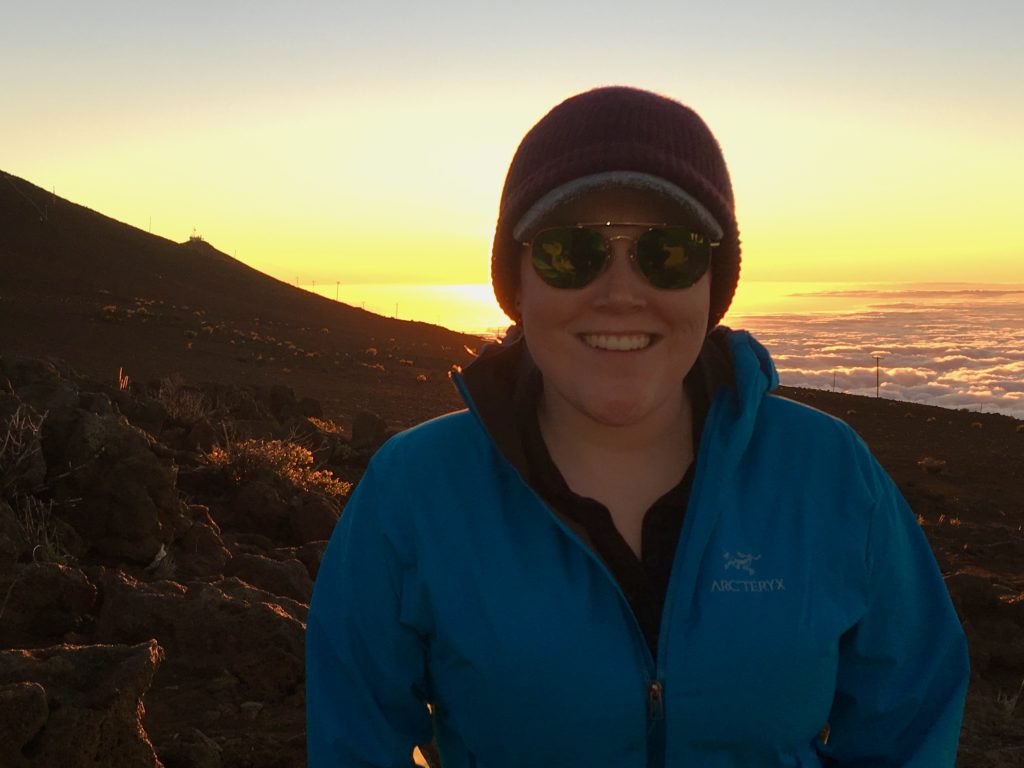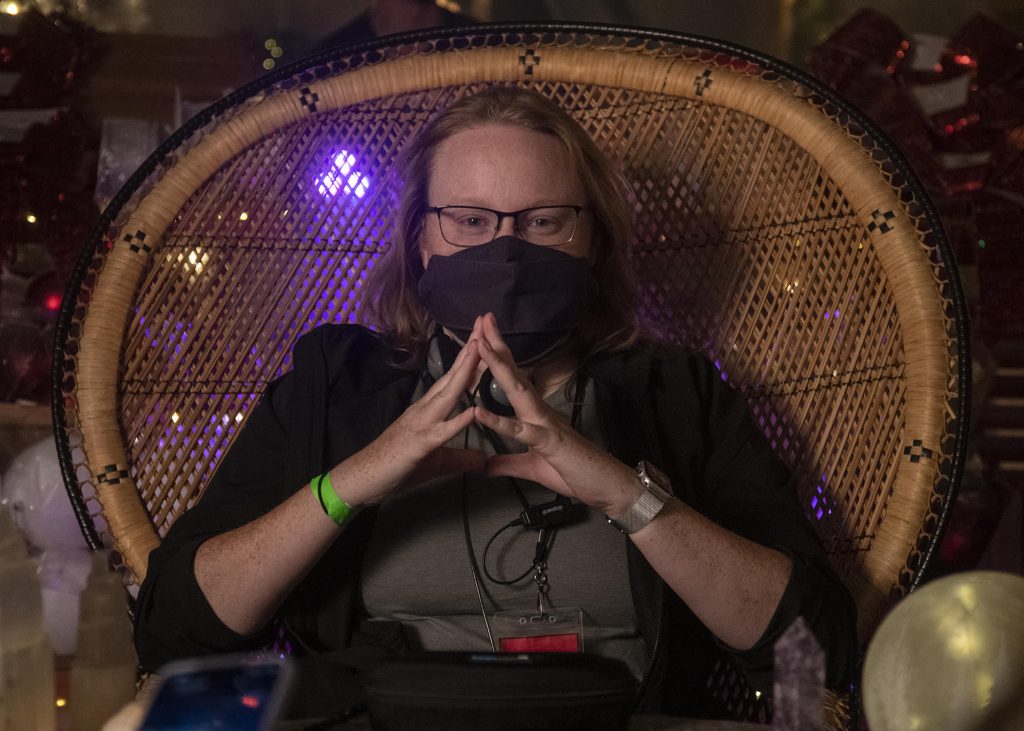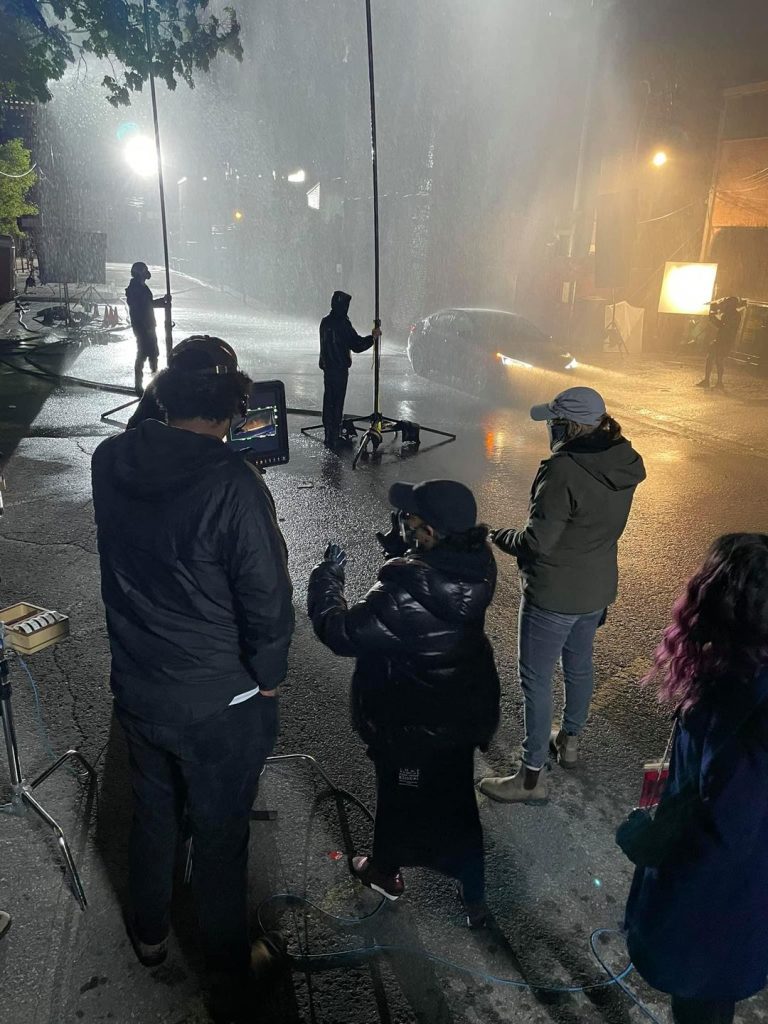With so many career options in the film and television industry, it can be overwhelming to figure out where you should apply your skills. Our industry Q&As with local crew provide an introduction to the different career paths available in the industry, helping you find what you’re passionate about and providing advice and tips that’ll help you land that dream job.
Shawna Steele is a First Assistant Director (1st AD) who has worked on several feature-length films, such as Under the Christmas Tree, Song & Story: Amazing Grace, and Hidden Family Secrets (aka A Mother’s Lie). Currently a resident of the east-end community of Cumberland, Shawna first joined Ottawa’s film industry in 2016 as an Assistant Production Coordinator, before making the leap to the Assistant Director (AD) department in 2018. In our first industry Q&A of 2022, Shawna shares some valuable insight on her career trajectory, the skills needed to succeed, and advice to others who want to pursue a similar path.

Can you tell us, in your own words, the role of a 1st AD?
In pre-production, I start by breaking down the script, flagging elements (cast members, background performers, locations, props, etc.) in each scene. Then I arrange all the scenes into the most efficient order for shooting, and schedule them across the shooting days. I’ll spend the rest of prep gathering information and adjusting the schedule; for example, Actor C is now unavailable for days 9-13, the diner location will only let us shoot on a Monday, it’s going to be raining for the first three days, the sidewalk scene needs to be shot in the morning light, and the flashback scenes have to be at the end of the schedule because Actor B is going to shave his beard. One of the key parts of prep is building a relationship with the director and getting into their vision as much as possible. During prep I am also chairing countless meetings, liaising with department heads, joining locations scouts, hiring the AD team, and working closely with the 2nd AD and Production Coordinator.
When we go to camera I have to completely change gears. It moves from an overhead view of the whole production, to a shot-by-shot, day-by-day marathon. I’ll review the plan for the day with the crew at the morning safety meeting (I’m liable for set safety, so we’ll talk through all the hazards). Then it’s about communicating and getting everybody moving in the same direction. Cast needs to be wired for sound, camera needs art to move a bunch of set dressing, lighting needs the floor for thirty minutes (make it twenty and you’ve got a deal), background performers need to rehearse, and locations needs the following people to move their cars. Then the cast comes in and we shoot it a few times, move the camera, and start again. I’m air traffic control, trying to get all the scheduled scenes shot in the time I’ve allotted for them, or (knock wood) faster. I’m the one that everybody looks at when things go sideways, but I also get to shout “Lock it up and roll sound!”
When the project moves to post-production I get to go home and sleep until the next rodeo comes to town.

1st AD Shawna Steele. Photo provided.
Did you always want to be a 1st AD? How did you get started in the industry?
I didn’t have specific ambitions; I went to film school thinking it would be a good opportunity to try everything and see what grabbed me. I did not have the steady hand needed for camera, nor the ear (nor arms) for sound. I directed one of the graduating shorts and a documentary short that went to Hot Docs. I also DP’d a 16mm short, AD’d a commercial, tried editing, writing, etc. Shortly after finishing school a family obligation brought me back to live in Ottawa where I started looking for any kind of job in the industry. A Facebook job posting led to an Office PA job on the second season of the CBC series Michael: Tuesdays & Thursdays; before we went to camera I was promoted to Assistant Production Coordinator. After that I APC’d a show with future heavy-hitters Shane Boucher and Caitlin Delaney, before doing a run of shows with another local institution: NB Thrilling Films. One of the producers at NB, Noël Zanitsch, decided I would do well on set so she pulled me out of my comfortable production office job (she would say kicking and screaming). I did about 10 days as a 3rd AD, then started the next show as the 2nd AD under the legend himself: JJ Gillanders. After a year, I followed JJ over to 1Department Entertainment Services where I made the jump to 1st AD in 2020, and continue to be tolerated.
What skills or training does a 1st AD need to be successful?
You’ll need to be computer/tech literate: Microsoft Office, Movie Magic Scheduling, Final Draft, cloud file management, digital communications, walkie etiquette. As a department head you’ll need to hire, train, and manage people; you’ll be managing up as often as you’re managing down. Time management is the job. You’ll need leadership skills to earn respect and run the floor. Creative thinking: you’ll need the ability to pivot and solve problems quickly and calmly. Diplomacy and tact are vital in a high-pressure environment. You’re setting the tone on set, so you’ll need to have a good handle on yourself emotionally and physically. Multi-tasking: I’m having a conversation with the camera operator standing in front of me, another with a producer on the phone, and one more over the walkie with my 3rd; I’m also watching a spark on a ladder, keeping an eye on the fake snow being laid down for the scene after lunch, and listening to make sure the air conditioner comes on while we’re between setups. You’ll be on your feet for 12+ hours a day; there’s also a lot of shouting involved.
What are the most challenging parts of your job?
During production, you are chiefly tasked with balancing the creative intentions of the director, and the financial intentions of the producer; it can be extremely difficult to advocate and keep everybody happy. Racing the rising or setting sun. The long days and short rest periods can be challenging if you’re not taking care of yourself (and regardless at times). Needing to motivate others when you’re running on empty. The uncertainty of working freelance on a contract-to-contract basis. Explaining to friends and family that I’m not a director’s assistant.

Shawna Steele. Photo provided.
What are the most rewarding parts of your job?
Obviously calling out the “picture wrap” is a hugely rewarding moment. Watching a junior AD that I’ve trained complete a task (for example: setting background) better than I could have done it myself is always awesome. Being on the monitors with the director when a complicated or multi-element (background performers, SPFX, moving vehicles, stunts, camera moves) shot goes off perfectly. I enjoy when a crew member indicates through word or deed that they’ve actually read my beautiful paperwork. It’s always fun to see the final product on the screen; I’m not usually able to sit back and enjoy something I worked on, I tend to skip through to the trick shots, scenes that were hard, scenes that were funny, and then watch all the credits. As an AD with creative ambitions, the most rewarding part is seeing a line of dialogue I pitched to the director make it into the final cut.
What advice would you give to others, especially in Ottawa, who are interested in furthering a career as an Assistant Director?
My main advice is always: resist the urge to go to Toronto before you’ve qualified for DGC membership. Here’s why: starting as an AD in Toronto likely means joining the GAP program (a great program with a lot of benefits) which allows you to work on a union set until you qualify for Associate Membership as a Set PA. Only then can you start working your way up, and you should still expect to spend a few more years as a Set PA. If you’re aiming for 1st AD (which isn’t for everyone, many find fulfilling careers as 2nd or 3rd) it can take 10+ years. In Ottawa (and other areas underserved by DGC members) you can gain experience on non-union shows and get permitted to work on union shows (meaning the DGC may allow you to work in a job category on a signatory show without a membership), which will get you the on-set days required to apply directly for Associate Membership (150), and potentially in a higher category (4th, 3rd, even 2nd). You’re likely to move up the department a lot quicker in Ottawa than in Toronto, but will find more and higher paying work in Toronto as a union member*.
Also: have an answer for “what are your ambitions?” or “what do you want to do?” that is NOT: “I want to be a director.” Every single Joe (Jane) Film School wants to be a director. Look at your favourite directors, what path did they take? Most of mine started as editors or writers, and a lot of 1st AD’s also become directors. I don’t know anyone who made the jump directly from PA to Director. You should have a reasonable plan that lets hiring managers (like me) know that you are a serious person. PS. Please don’t @ me about Tarantino; yes, his first film went to Sundance after he financed it by playing an Elvis impersonator on the Golden Girls, but that is generally not a viable career path for myriad reasons (may they rest in peace).
Finally: there are several ways to find out what’s shooting or prepping (networking, union hotlists, the film office, social media, production companies, etc.). Identify and reach out to production offices, Production Managers, 1st AD’s and 2nd AD’s. People often forget the 2nd AD, but they’re the ones hiring the dailies, which is the absolute best way to get your face in front of the 1st AD, who hires for show calls. Have a clean and simple resume (1 page); I’m looking at your formal education, and real-world work experience. A lot of the necessary soft skills are entirely transferable from other jobs. For example, I’d much rather hire someone who worked at McDonald’s than someone who shot short films with their friends. The McDonald’s job shows that you have experience working with people, on a team, with a command structure, and under pressure, you’ve probably got customer service skills which means I can probably trust you to be around cast, and if you worked there for more than a few weeks you’re probably punctual and reliable even with strenuous hours and workload, etc.
And don’t forget to be resilient, you might get a polite “not hiring right now” (and that’s very often true), but when I’m scrambling to find a warm body and searching through my old emails for resumes I’m probably going to reach out to someone who has sent me a friendly reminder and resume every six weeks, over someone who sent me their resume six months ago, never to be heard from again.
* There’s also the non-union world to investigate; it’s filled with awesome and committed people, interesting projects, and offers a quicker run up the ladder. I didn’t explore it very much because I like money, health benefits, free training, and retirement contribution matching. My advice for non-union work is to always do the math before signing a deal memo: film work is exempted from work limit and rest period laws, so, are they paying any overtime? If so, after how many hours? How long is their standard shoot day? Will you need to regularly work before crew call and/or after wrap? Ultimately, does the $$$/day they’re offering you work out to more than minimum wage? And does it cover any other costs (travel, lodging, food, gear) you will incur? If you like working non-union, get yourself some supplemental health insurance and be proactive about retirement saving, you won’t be young and spry forever.

On set. Photo provided.

